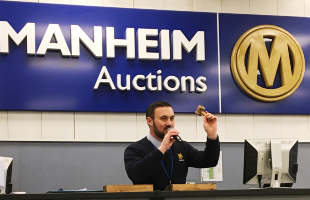Manheim, the UK’s number 1 CV auction company, has revealed that more records were broken in July with both conversion rates and average selling prices setting new all-time highs.
 At £8079, average van values at Manheim were up 5.5% (+£423) versus June and a staggering 31% higher compared to July 2019, despite slight increases in age and mileage.
At £8079, average van values at Manheim were up 5.5% (+£423) versus June and a staggering 31% higher compared to July 2019, despite slight increases in age and mileage.
90% of vans were sold at their first time of asking, seeing stock liquidated four days faster than the same period in 2019. Manheim believes it is not just a supply shortage driving these new records in conversion and sale price, as overall auction arrivals have been consistent with June and only tracking 11% behind year-on-year.
Despite rental de-fleet volumes falling in line with expectations, the percentage of Euro 6 vans sold in July increased, representing just under half of all wholesale vans sold. These vans had an average selling price of £11,189 and were 27 months old with 36,665 miles.
The differential between pre-Euro 6 stock is clear to see, with an average selling price of £5,574 and an average age of 70 months and 83,255 miles in comparison. Buyer attendance also jumped by 4% from June, with over 1,000 unique buyers winning vans digitally. Franchise activity was also noticeably improved, with 11% of all vans sold finding a franchise home. At a 5% year-on-year increase, this underlines the increasing focus on used in this sector in the absence of new volumes.
Around a quarter of vans sold in July were processed through Manheim’s innovative ‘virtual lane’ approach. This sees Manheim able to virtually chorale vans from across any physical de-fleet location to hold one digital auction event – all using the same Manheim inspection reports and imagery ensuring that buyers can bid in full confidence.
Buyers can access more stock in one digital event, ultimately fulfilling more retail orders, rather than having to log onto separate auction events.
For vendors, this flexibility sees them able to slash their days-to-sell whilst reducing logistics costs. In this virtual lane model, vans are de-fleeted into their nearest Manheim CV centre rather than the auction centre hosting the physical sale. Manheim sees this as a more effective use of time and resource for both buyers and vendors and just is one example of how digitalisation is being accelerated within its business. Only 10% of Manheim’s buyers currently buying digitally were ‘physical only’ auction buyers pre-lockdown.
Matthew Davock, director of CV, Manheim, commented: “Manheim’s digital sales proposition has been incredibly well received by vendors and buyers alike who have seamlessly adapted to digital. Feedback has also been very positive, with customers referencing Manheim’s customer service, trusted position and support as the main factors underpinning their confidence to shift to digital. For vans located both on and off Manheim sites, our agility and technology have led the industry and our new ‘virtual lane’ proposition has demonstrated value to our vendors with duplicate and unsold stock selling on average 4 days faster than pre-lockdown.”
He continued: “Buyer sentiment currently falls into two camps: 60% of dealers we engaged said they had enjoyed record-breaking sales and profitability with many even increasing retail prices to reflect wholesale value increases. The second camp of buyers reported general frustration, with 40% balancing stocking up at these higher auction values against the risk of weakening retail demand with holiday season combined with the potential of a second COVID spike. The last week of July showed some typical signs of seasonality. We must be confident in our ability to separate seasonality from wider economic market pressures and remain positive.”
James Davis, customer insight director, Cox Automotive UK, added: “In stark contrast to new registration figures, the year continues to deliver outstanding performances in the used van sector. Due to the global shutdown, I believe it is somewhat irrelevant to reflect on monthly van registration movements. So, whilst it’s positive that volumes in June and July are up, the July SMMT data shows year to date that registrations are down 38.6%. Furthermore, their recently revised 2020 forecast sees that position improving but still 26.3% behind 2019 at 269,000 vans.
“With a paradigm shift to home delivery, it will be interesting to see how we, as consumers, continue. If this is a permanent adjustment, I would suggest new van registrations would recover to a stronger level. In the meantime, the supply pipeline for used vans is squeezed as we come out of a recessionary position. I predict the used market is likely to be buoyant for many years.
Davis concludes: “With CAP HPI’s average 6.5% upward adjustment in August Red Book, in my memory the largest ever upward movement in one month, there will be derivative winners and losers in the detail. Vendor expectations will need to be managed and supported with insight and data, with which we are best placed to support. I believe H2 wholesale de-fleet volumes will stay consistent with June and July supply levels. Q3 typically sees rental fleet replacement cycles, which will be dependent on OEM supply this year so we could see some large swings to OEMs with available volume. Large fleet operators are currently clearly focusing on their own business operations and structures so fleet replacement orders will likely be deferred until resized operations are understood.”
